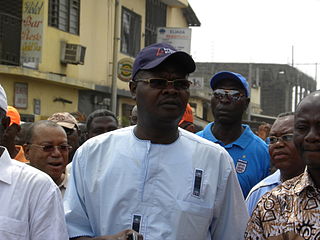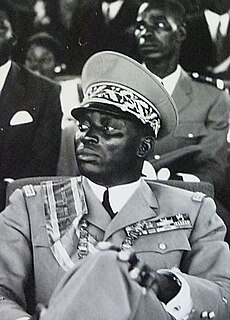The history of Togo can be traced to archaeological finds which indicate that ancient local tribes were able to produce pottery and process iron. During the period from the 11th century to the 16th century, the Ewé, the Mina, the Gun, and various other tribes entered the region. Most of them settled in coastal areas. The Portuguese arrived in the late 15th century, followed by other European powers. Until the 19th century, the coastal region was a major slave trade centre, earning Togo and the surrounding region the name "The Slave Coast".
Koffi Sama was the Prime Minister of Togo from 29 June 2002 to 9 June 2005.

Elections in Togo take place within the framework of a presidential system. Both the President and the National Assembly are directly elected by voters. The country is a one party dominant state with the Union for the Republic in power.
Fambaré Ouattara Natchaba is a Togolese politician. He was the President of the National Assembly of Togo from 2000 to 2005. He is a prominent member of the ruling Rally of the Togolese People (RPT) and is a member of the Pan-African Parliament representing Togo.
Kwassi Klutse is a Togolese politician who was the Prime Minister of Togo from August 20, 1996 to May 21, 1999.
Gilchrist Olympio is a Togolese politician who was a long-time opponent of the regime of Gnassingbe Eyadema and was President of the Union of Forces for Change (UFC), Togo's main opposition party from the 1990s til 2013. Olympio is the son of Sylvanus Olympio, Togo's first President, who was assassinated in a 1963 coup. He is now an ally of the current regime of Faure Gnassingbe, the son of the late President.

The Action Committee for Renewal is an opposition political party in Togo. Dodji Apévon has led the party since 2008; previously it was led by Yawovi Agboyibo from 1991 to 2008.

Messan Agbéyomé Gabriel Kodjo is a Togolese politician who served as Prime Minister of Togo from 29 August 2000 to 27 June 2002.

Parliamentary elections were held in Togo on October 14, 2007 for the 81 seats in the National Assembly. There were over 2,000 candidates, with 32 parties and 41 lists of independent candidates competing. The ruling Rally of the Togolese People (RPT) was victorious, winning a majority of 50 seats. The remaining seats were won by opposition parties; the Union of the Forces of Change (UFC) won 27 seats and the Action Committee for Renewal (CAR) won four seats. They were the first parliamentary elections since the beginning of multiparty politics in the early 1990s in which all major parties participated.

The Democratic Alliance for the Fatherland, also known as simply L'Alliance, is a political party in Togo.
Maurice Dahuku Péré is a Togolese politician who was President of the National Assembly of Togo from 1994 to 1999. He is the National President of the Democratic Alliance for the Fatherland, an opposition party.
Issifou Okoulou-Kantchati was a Togolese politician, who last served in the government of Togo as Minister of City Planning and Housing.

Presidential elections were held in Togo on 4 March 2010. Incumbent President Faure Gnassingbé—who won his first term in a presidential election that followed the death of his father, long-time President Gnassingbé Eyadema, in 2005—faced radical opposition candidate Jean-Pierre Fabre, the Secretary-General of the Union of the Forces of Change (UFC), as well as several minor opposition candidates.

Parliamentary elections were held in Togo on 6 February 1994, with a second round on 18 March in 24 constituencies. The first multi-party elections since the 1960s, they saw the ruling Rally of the Togolese People (RPT) finish second behind the Action Committee for Renewal (CAR), who together with their allies the Togolese Union for Democracy (UTD), gained a majority in the National Assembly.

Parliamentary elections were held in Togo on 21 March 1999. They were boycotted by the eight opposition parties, who been rebuffed in their insistence that talks following the controversial presidential elections the previous year must be completed prior to the parliamentary elections. As a result only three parties ran in the elections, the ruling Rally of the Togolese People (RPT), together with two small parties allied with it; the Coordination of New Forces and the Pan African Environmentalist Party. In addition, twelve independent candidates also ran.






